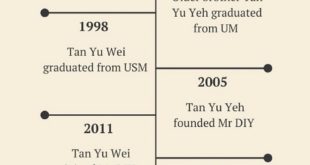The Tiny House concept has been on a rise, which was one of the propelling factors for serial entrepreneur Seah Liang Chiang to build Singapore’s first Shipping Container Hotel.
People around the world are choosing to downsize their living spaces, with a Netflix reality TV show revolving around the topic, popularising the movement amongst millennials.
In an interview with DrWealth, Liang Chiang shared that he had graduated from the National University of Singapore in a recession year.
He eventually managed to find a job doing sales, but got fired after six months. The same happened in his second and third job.
He decided to start his first company and even though he managed to become a millionaire “on paper” before he hit age 30, he ran into problems with his partners and thus left the company.
At just 29, he was in close to S$ 100,000 of debt.
“I didn’t have any money because all the money I had was with the company, I was pretty much alone and I couldn’t even go see my parents in Malaysia,” he said.
Instead of finding a full-time job, he decided to start yet another company.
Fortunately, he managed to find an investor who believed in him, and the company eventually made it to an IPO (initial public offering).
The Shipping Container Hotel is the latest of Liang Chiang’s many entrepreneurial ventures, and he shared that he is “able to do things differently” and “make less mistakes” with the lessons learnt from his past experiences.
Thinking Out Of The Box
It all began with a personal problem.
The 55-year-old had managed to acquire some land in Malaysia facing a lake, but did not have the money to build a house on it.
He rationalised that even though he did not have the means to build a big house, he could build a small cabin instead.
Inspired by the Western culture of having a “weekend getaway home” and movies like Avengers: Endgame where Tony Stark had a cabin in the woods, Liang Cheng set out to research on how to build one himself.
He found out that shipping containers were cheap to buy and repurpose, and people in other parts of the world were already using them as houses.

After he realised it was possible to make a beautiful house out of a shipping container, he bought one for RM5,000 (S$ 1,635). He also designed the interior himself through free online design softwares.
All in all, he spent a grand total of RM30,000 (S$ 10,000) on his personal shipping container home.
From Personal Project To Business Idea

The serial entrepreneur decided to start a shipping container pop-up hotel, which Singaporeans could use as weekend retreats and go to off-the-grid places.
He wrote in to the Ministry of Trade and Industry (MTI) and was able to benefit from the First Mover Framework.
The framework gives entrepreneurs with innovative business ideas a head-start in the allocation of public assets to implement their ideas.

Even though Liang Chiang faced many challenges in getting permissions and approvals from various authorities, he eventually managed to get two plots of land at JTC Launchpad @ one-north.
JTC Launchpad is well-known as a startup hub where aspiring entrepreneurs can test-bed ideas, and there was already a container gym there before the arrival of Liang Chiang’s hotel.
According to Liang Chiang, the hotel is like a “tiny house” or small apartment, and spans around 280 square feet.
Despite its size, it is fully equipped with a full kitchen, dining area, two queen-sized beds, a bathroom, wifi and a television.
Each shipping container can accommodate up to five people, and a night at the hotel will set you back from S$ 150 to S$ 170.
A Hit Amongst Singaporeans

The shipping container hotel first opened its doors in January this year, and Liang Chiang shared that before Covid-19 hit in February, the occupancy rate was around 90 per cent.
When Covid-19 hit and travel was limited, Liang Chiang was extremely worried as he had built this hotel with tourists in mind. However, he soon realised that most of his customers were Singaporeans who “loved this crazy idea”.
Of course, the hotel was unable to take in any customers during the circuit breaker period and had “zero business”.
“It was really tough because we had to pay rent to JTC, and we had staff costs to cover as well,” Liang Chiang said.
Things improved when Singapore entered Phase 2 and staycations were allowed. Singaporeans started “coming out in full force” to book the hotel, and since three weeks ago, there was a 100 per cent occupancy rate.
While the shipping containers are only at JTC Launchpad at the moment, Liang Chiang is planning to switch up its location every few years, such that it operates like a pop-up hotel.
“It’s the early days but do not be surprised if one day you see our hotels in the parks or beach. Thats the dream I have, to put it in crazy places,” he said.
Featured Image Credit: Shipping Container Hotel via Facebook



